Many law firms aggressively advertise that one of the reasons that you should hire them is because "you don't pay, unless we win." Originally, what many law firms mean by this advertising is that you would not have to pay fees to them unless they were successful in the litigation. However, this ignores the fact that in Ontario we have what is commonly referred to as a " loser pay"" legal system; that is, if you successfully sue someone who has injured you, in addition to paying the damages, they will generally be ordered to pay part of your legal bill. However, the flipside to that is that if you are unsuccessful in your lawsuit you will be asked to pay part of the defendant's (or more accurately the defendant's insurance company's legal costs). This is a significant risk, and many lawsuits were settled over the years by plaintiffs who had legitimate claims but were afraid to the risk to them and their families of losing at trial.
Over the last several years, a product called 'adverse cost insurance' has been developed to try and provide additional protection to plaintiffs and to give them the confidence to continue to take their cases to trial. Basically, a plaintiff (or perhaps, a law firm) pays a fee to purchase an insurance policy that will pay a certain amount of money for expenses (called disbursements) and an additional amount of money to the defendant insurance company if the plaintiff is unsuccessful in the litigation.
In theory, adverse cost insurance sounds like a win-win proposition." However, the recent Ontario Superior Court case of Loye v. Bowers, 2020 ONSC 792 exposes some of the potential shortfalls related to these sorts of arrangements.
In this lawsuit, liability was hotly contested, but in the end the plaintiff was successful in convincing the jury that the defendant was liable for his injuries. Fortunately, the jury awarded only $10,000 in general damages for pain and suffering. The jury did not know that there is a deductible for pain-and-suffering which is now almost $40,000. In this case, the deductible wiped out the plaintiff's recovery and he received nothing. Since the defendant was successful, it asked the trial judge to order the both the plaintiff's lawyer and the plaintiff himself should be responsible for their legal costs.
To simplify, since the plaintiff received nothing for damages, the defendant won the case. As mentioned earlier, in the "loser pay" system, the plaintiff may be on the hook for the defendant's legal costs. The trial judge, Justice Turnball ordered that the plaintiff and not his lawyer were responsible for paying legal costs.
Interestingly, the plaintiff in this case had had the foresight to purchase cost protection insurance to protect himself from this sort of circumstance. However, for reasons that are not disclosed, it appears that the company that provided adverse cost insurance had terminated coverage only five days before the start of the trial. Even worse, while the typical adverse cost insurance policy provides for coverage of up to $100,000, the legal costs alone with the plaintiff was ordered to pay the defendant insurance company where fixed by the judge at $189,298.68. In other words, even if the insurance policy had not been canceled only a few days prior to trial, the typical insurance policy appears to be insufficient to have protected the plaintiff.
The question of whether adverse cost insurance is appropriate is currently being vigorously debated by judges, the courts, and the legal system as a whole. On the one hand, adverse cost insurance may protect a plaintiff who has a meritorious case but is forced to settle because she is afraid of the negative cost consequences that may flow if she is not successful in her litigation. On the other hand, some individuals involved in the justice system worry that adverse cost insurance may actually cause either unreasonable plaintiffs or money-seeking defendants to force a case to trial when it would otherwise settle. Even worse, the Loye" decision stands for the proposition that even someone who purchases" the insurance may find that coverage is not in place when she needs it or that, even if it remains active, it is insufficient to fully protect them.
If you and your lawyer decide to purchase cost protection insurance, you should be very careful to discuss scope of your coverage, find out how and when it might be canceled, and ascertain whether the product will provide full protection for you in a difficult case. It is important to speak to an experienced personal injury lawyer about your potential case at 705-722-6393 or through our contact form. Rastin Gluckstein Lawyers is here to help!"
Share
Subscribe to our Newsletter

